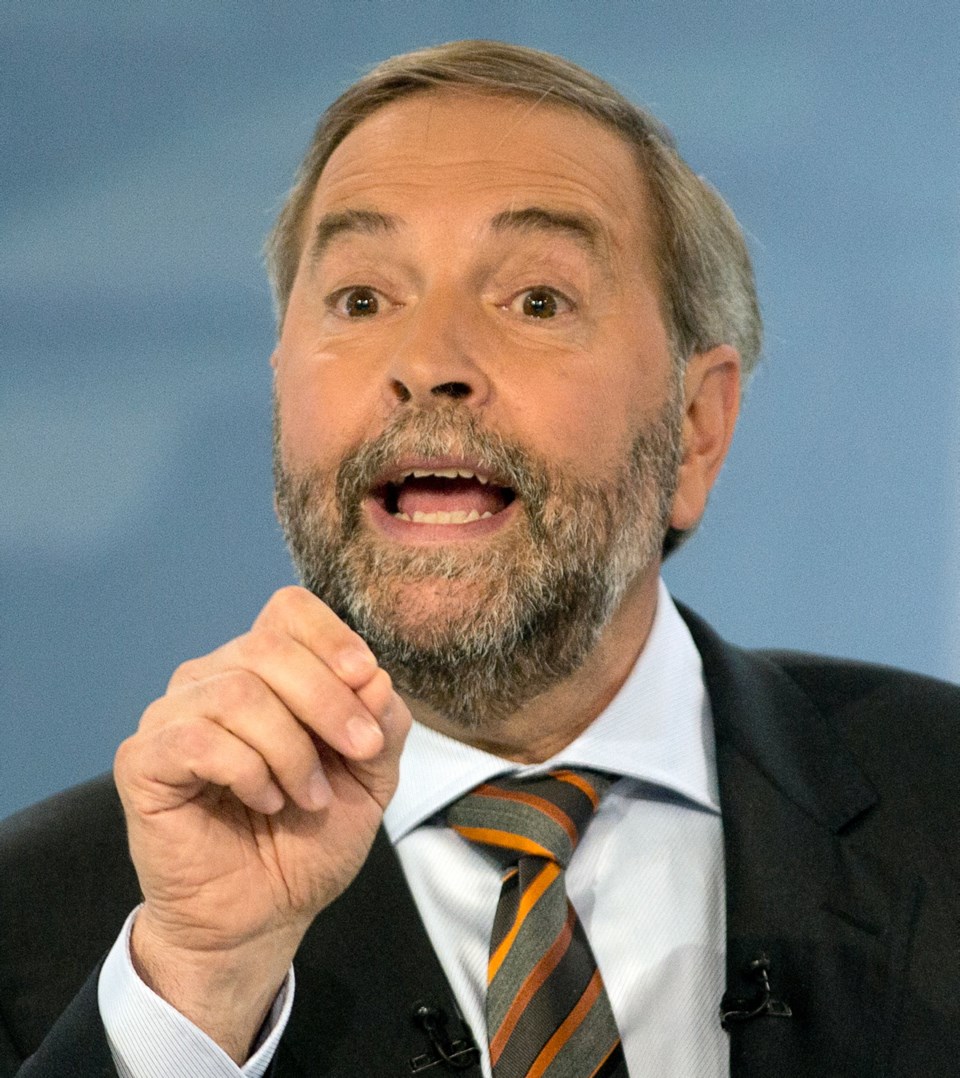THE CANADIAN PRESS
MONTREAL — Tom Mulcair, the political leader with the most to lose in Quebec, found himself beating back attacks on multiple fronts Thursday during a chippy and heated French-language debate in Montreal.
All night long, the NDP leader’s rivals — armed with delicate issues that resonate with particular vibrancy in Quebec — lobbed their rhetorical grenades at the province’s presumed front-runner.
They targeted his positions on everything from pipelines and national unity to the boiling debate about whether Islamic face coverings like the niqab should be outlawed at citizenship ceremonies.
A combative Mulcair met every attack head on, often raising his voice to be heard over the din of his opponents.
In perhaps the most heated melee of the debate, Mulcair slammed the Conservatives and the Bloc Quebecois for supporting a ban on citizenship applicants wearing face coverings when they swear the oath.
He also reiterated his support for the existing rule that states anyone seeking citizenship must uncover their face in order to identify themselves before making their pledge.
The issue of face coverings at such ceremonies may involve a minuscule number of applicants, but the wider, emotional debate on the subject has the potential for far-reaching electoral implications.
At the height of the confrontation, Mulcair and Conservative Leader Stephen Harper stared each other down, each talking over the other, as the moderator tried in vain to intervene and re-establish control.
Mulcair called Harper’s push to ban veils like the Islamic niqab at the ceremonies “a weapon of mass distraction” to divert public attention from what he described as the Tories’ poor track record.
“Mr. Harper is trying to hide his record behind the niqab,” he said.
Harper, who has called it “offensive” to cover one’s face while taking the citizenship oath, said people should not hide their identities when joining the Canadian family.
“Mr. Mulcair, I will never tell my young daughter that a woman should cover her face because she’s a woman,” Harper said.
The NDP leader struck back.
“Attack the oppressors, don’t attack women ... attack the oppressor if you believe there is oppression in there and have the courage to do so,” Mulcair said.
“But it’s not by depriving these women of their citizenship and their rights that you’ll be able to help them.”
On the subject of national unity, Mulcair was targeted by Liberal Leader Justin Trudeau for the NDP’s policy, which would accept a simple majority plus one for Quebec to secede in a future referendum on independence.
The existing Clarity Act, introduced by the Liberals, calls for a clear majority.
The NDP policy, known as the Sherbrooke Declaration, is supported by many Quebecers. But federalists outside the province might fear it would make it easier to split up the country.
Trudeau accused Mulcair of hiding the policy from Canadians outside Quebec.
He warned it could lead to the Constitution being ripped apart by a single vote and described Mulcair’s position as worrying for someone who wants to be Canada’s prime minister.
“Mr. Mulcair likes to talk about it in French, but he doesn’t talk about 50 per cent plus one in English,” Trudeau said during an exchange with the NDP leader that once again prompted the moderator to step in.
Mulcair snapped back at Trudeau, calling it a fair, democratic policy. He also noted the Sherbrooke Declaration is available in English.
Trudeau also accused Mulcair of expressing support for bulk water exports to the United States during his time as Quebec environment minister.
“It’s spectacularly false,” Mulcair said in response to the allegation.
Following Thursday’s event, the NDP leader said Trudeau was highlighting only a portion of a much longer public discussion on the issue at the time.
Mulcair insisted he ultimately maintained “extraordinarily tough restrictions” on the issue.
On pipelines, Bloc Leader Gilles Duceppe tried to frame Mulcair as someone who takes different positions on pipelines like TransCanada’s Energy East proposal, depending on whether he’s in Quebec or not.
Energy East, which would transport crude from Alberta through Quebec, is a controversial issue in the province due to concerns over potential ecological risks.
Leaders will square off in French again next Friday.
The niqab debate, however, might pose the most significant threat to the NDP in Quebec.
Using a pre-emptive tactic, Mulcair tried to get out in front of the issue Wednesday by delivering a speech that explained the party’s position and called for calm on the matter.
The address, which he gave in Montreal, was also an attempt for him to get his message out without the interruptions he would face in the tumult of a debate.
However, it remains to be seen whether the move will help the NDP cause, which appears to be slipping in Quebec.
The issue hits home for many voters in a province where there is considerable support for a niqab ban at the ceremonies. Quebec has seen explosive, emotional debates in recent years over the accommodation of religious minorities.
As a result, the NDP’s firm stance on the issue threatens to chip away at its bedrock of support in the province.
Recent polls have suggested the NDP’s support inside its Quebec fortress has started to sag — a change that could echo beyond the province’s borders and have a major impact on the outcome of the Oct. 19 election.


